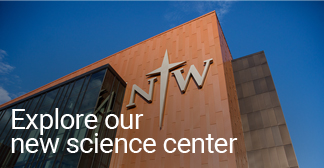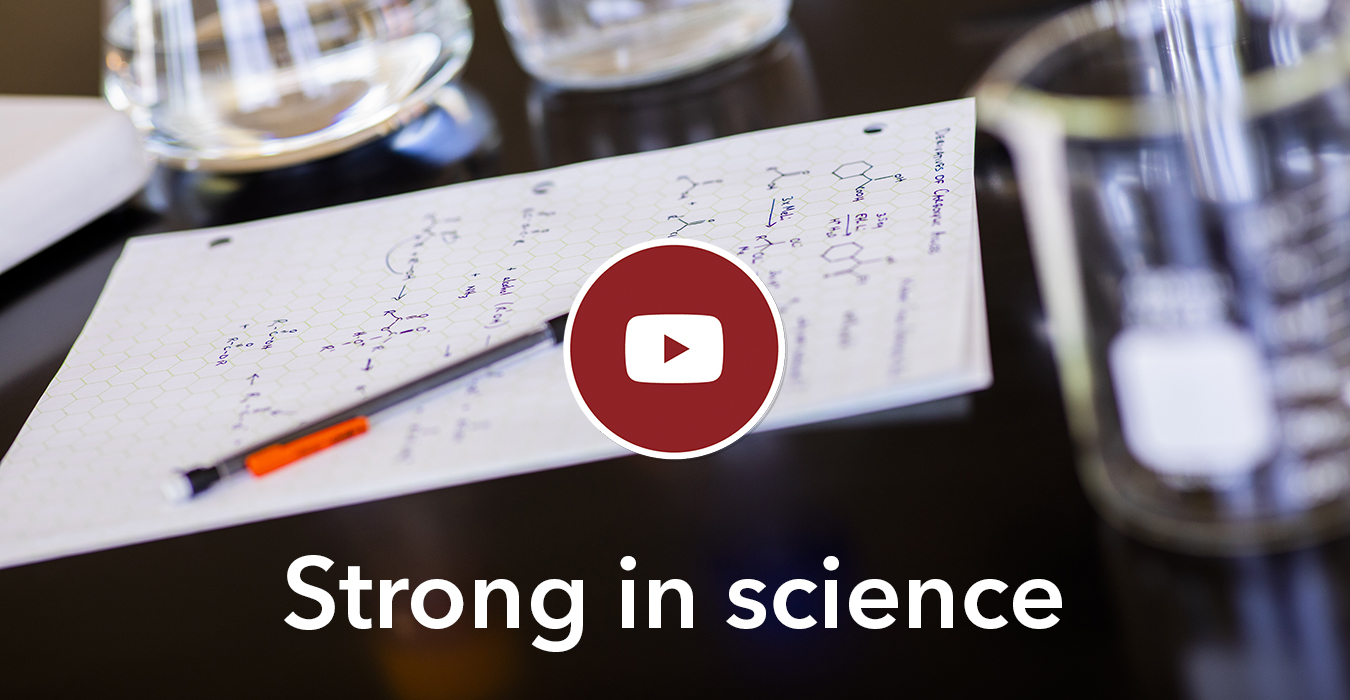Chemistry courses
CHE101SN - College Chemistry
(4 credits) (NWCore option under Science and the Natural World) This course is an introduction to inorganic chemistry, with an emphasis on the health sciences. It is well suited for students whose programs require one year of chemistry.Note: Three lectures and one 1.5 hour laboratory period per week. Open to all students. A fee is associated with this course.
CHE102 - College Chemistry
(4 credits) An introductory course in organic and biological chemistry. The content is especially suited to meet the needs of students whose programs require only one year of chemistry. Prerequisite: CHE101SN.Note: Three lectures and one 1.5 hour laboratory period per week. A fee is associated with this course.
CHE105SN - Topics in Chemistry
(4 credits) (The topic of Forensics is an NWCore option under Science and the Natural World) This course offers an introductory level chemical exploration of interdisciplinary scientific, cultural, or theological topics. Possible topics includeenergy and environment, forensic chemistry, chemistry and art, nanotechnology, and medicinal chemistry. Note: A fee is associated with this course.
CHE108SN - General, Organic and Biological Chemistry
(4 credits) (NWCore option under Science and the Natural World) General, Organic, and Biological Chemistry (GOB) is a one-semester survey of inorganic, organic, and biological principles. Topics include atomic and molecular structure, chemical reactions, organic and biological molecules, solutions, acid-based chemistry, and metabolism. The treatment of topics is predominantly descriptive and the course is recommended for programs that require one semester of chemistry. This course does not count toward a chemistry major or minor, nor does it count toward the biology cognate requirements. This course is offered concurrently online and on-campus. The online course includes online lectures and one 1.5 hour laboratory per week; it is only open to RN-BSN students. The on-campus course includes three lecture periods and one 1.5 hour laboratory per week t. Note: Students with math ACT scores below 19 are strongly encouraged to take Basic Algebra prior to enrolling in this course.
CHE108SNA - General, Organic and Biological Chemistry
(4 credits ) (NWCore option under Science and the Natural World) General, Organic and Biological Chemistry (GOB) is a one-semester survey of inorganic, organic and biological principles. Topics include atomic and molecular structure, chemical reactions, organic and biological molecules, solutions, acid-base chemistry and metabolism. The treatment of topics is predominantly descriptive and the course is recommended for programs that require one semester of chemistry. This course does not count toward a chemistry major or minor, nor does it count toward the biology cognaterequirements. This course is offered concurrently online and on-campus. The online course includes online lectures and one 1.5 hour laboratory per week; it is only open to RN-BSN students. The on-campus course includes three lecture periods and one 1.5 hour laboratory per week.Note: Students with math ACT scores below 19 are strongly encouraged to take Basic Algebra prior to enrolling in this course.
CHE108SNLA - General, Organic and Biological Chemistry Lab
CHE111 - General Chemistry
(4 credits) An introductory course in chemistry that emphasizes physical and inorganic concepts, problems and calculations. Topics include chemical reactions, stoichiometry, properties of gases, thermochemistry, theories of atomic structure, and chemical bonding. The general chemistry sequence (Chemistry 111 and Chemistry 112) is recommended for students with good math / science preparations who intend to proceed to advanced courses in chemistry, the biological sciences or engineering. Prerequisites: high school chemistry and ACT math score of at least 22 (SAT 540 or above) or sophomore status. Note: Three lectures and one three-hour laboratory period per week. A fee is associated with this course.
CHE112 - General Chemistry
(4 credits) A continuation of Chemistry 111. Topics covered include kinetics, thermodynamics, chemical equilibria, acid-base chemistry and nuclear chemistry. Prerequisite: CHE111 or consent of the instructor.Note: Three lectures and one three-hour laboratory period per week. A fee is associated with this course.
CHE211 - Quantitative Analysis
(4 credits; alternate years, consult department) The theory and practice of volumetric and gravimetric analysis, including the use of oxidation-reduction reactions and spectrophotometry. Prerequisite: CHE112 or CHE102 and permission of instructor.Note: Three lectures and one three-hour laboratory period per week. A fee is associated with this course.
CHE315 - Instrumental Analysis
(4 credits; alternate years, consult department) A study of the theory and operation of common laboratory instruments. Topics include: infrared, visible and ultraviolet spectroscopy; atomic absorption and emission spectroscopy; nuclear magnetic resonance spectroscopy; mass spectrometry; gas and liquid chromatography; electrochemical methods. Prerequisite: CHE211 or permission of instructor.Note: Three lectures and one three-hour laboratory period per week. A fee is associated with this course.
CHE321 - Organic Chemistry
(4 credits) The study of carbon compounds and their functional groups, including nomenclature, synthesis, reactions, structures, mechanisms and spectroscopic analysis. Prerequisites: CHE112 or permission of instructor.Note: Three lectures and one three-hour laboratory period per week. A fee is associated with this course.
CHE322 - Organic Chemistry
(4 credits) A continuation of the study of carbon compounds and their functional groups, including nomenclature, synthesis, reactions, structures, mechanisms and spectroscopic analysis.Prerequisite: CHE321.
CHE326 - Biochemistry: Proteins and Metabolism
(4 credits) A fundamental course surveying biomolecules, catabolism, bioenergetics and biosynthesis. Prerequisites: CHE321 and 322. Cross-Referenced: Cross-referenced in biology.Note: Three lectures and one three-hour laboratory period per week. A fee is associated with this course.
CHE330 - Biochemistry: Macromolecular Interactions
This course is a study of the thermodynamic, kinetic, and structural parameters that facilitate interactions between macromolecules, including protein-protein, protein-DNA, and protein-ligand interactions. It emphasizes the principles of biophysical techniques used to study macromolecules, such as molecular spectroscopy, x-ray crystallography, and mass spectrometry. Prerequisites: BIO326 or CHE326. Note: Three lectures and one three-hour laboratory period per week. A fee is associated with this course.
CHE398 - Directed Study
CHE411 - Advanced Inorganic Chemistry
(3 credits; alternate years, consult department) A study of the chemistry of metals and nonmetals with an emphasis on periodicity, chemical bonding, structure and reaction mechanisms. Prerequisite: CHE322.
CHE417 - Internship
(4 credits may apply toward the major)
CHE425 - Biology/Chemistry Research Seminar
(1/4 credit; non-yearly, consult department) A weekly research seminar of in-progress studies in chemistry and biology by Northwestern students, faculty and selected invited guests from other institutions. Featuchemistry: Proteins and Metabolism A fundamental course surveying biomolecres presentation, discussion, analysis and critique of original research. Prerequisite: permission of instructor. Note: Course may be repeated. Graded on a pass/no pass basis. Student must attend 90% of the total number of seminars offered during the term to receive a passing grade.
CHE433WI - Introductory Physical Chemistry
(4 credits; alternate years, consult department) (Writing intensive) An introductory course in chemical thermodynamics, quantum chemistry and chemical kinetics. Prerequisites: MAT112QR; and CHE112 or PHY212. Cross-referenced in physics.Note: Three lectures and one three-hour laboratory period per week.
CHE436 - Intermediate Physical Chemistry
(4 credits; alternate years, consult department) An intermediate course in chemical thermodynamics, quantum chemistry, and chemical kinetics. Prerequisite: CHE433WIx. Cross-Referenced: Cross-referenced in physics.Note: Three lectures and one three-hour laboratory period per week. A fee is associated with this course.
CHE450SR - Science and the Christian Faith
(3 credits) Science and Christian Faith is a senior seminar course designed for biology and chemistry majors. The course revisits the three FYS course questions: Who am I? Who are my neighbors? How will we live in the world? Our thoughtful examination of these three questions will draw on knowledge gained from your biology and chemistry courses, but also integrates broadly with your liberal arts education (religion, philosophy, etc.) as we explore questions of origins, creation care, and bioethics and through the lens of Christian faith and theology. The readings, written assignments, oral presentations, and discussions will lead us to consider how God calls us, as scientists and people of faith, to be agents of redemption in our world. Prerequisites: senior biology or chemistry major. Junior biology or chemistry majors who cannot take this course during their senior year may request permission from their advisor who will consult with the department chairs to register.


